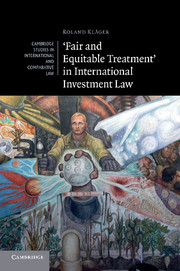Book contents
- Frontmatter
- Contents
- Foreword
- Acknowledgements
- Table of cases
- Table of treaties
- List of abbreviations
- 1 Introduction
- Part I The construction of fair and equitable treatment
- 2 Fundamentals for the construction of fair and equitable treatment
- 3 Fair and equitable treatment and the international minimum standard
- 4 The role of international law in the construction of fair and equitable treatment
- Part II The concept of fair and equitable treatment
- Part III The position of fair and equitable treatment in the international legal system
- 10 Conclusion
- Bibliography
- Index
- misc-endmatter
4 - The role of international law in the construction of fair and equitable treatment
Published online by Cambridge University Press: 05 July 2011
- Frontmatter
- Contents
- Foreword
- Acknowledgements
- Table of cases
- Table of treaties
- List of abbreviations
- 1 Introduction
- Part I The construction of fair and equitable treatment
- 2 Fundamentals for the construction of fair and equitable treatment
- 3 Fair and equitable treatment and the international minimum standard
- 4 The role of international law in the construction of fair and equitable treatment
- Part II The concept of fair and equitable treatment
- Part III The position of fair and equitable treatment in the international legal system
- 10 Conclusion
- Bibliography
- Index
- misc-endmatter
Summary
A Fragmentation and international investment law
International investment law is part of international economic law and therefore also a component of general international law. Such a truism may be proved by a glance within any textbook. Nevertheless, it appears to be worth mentioning here, since international investment law has evolved into a very specialised field of international law that is mainly governed by a dense network of investment treaties and practised by a growing, but still limited, community of arbitrators, counsellors and scholars. Moreover, the conclusion of BITs was intended, at least partly, to displace the vague customary international law regime, which had previously dominated the regulation of foreign investments. In addition, the growing body of arbitral case law is gradually becoming a self-referential system that is displaying an increased momentum of its own, with a diminishing necessity to consider external sources of law or other judicial decisions. To such an extent, the emergence of international investment law as a specialised field of international law as well as the consolidation and deepening of its standards entails a certain decoupling from the general rules of international law. Therefore, modern international investment law not only forms a spearhead of legal and economic globalisation, contributing to a global streamlining of investment-related regulations, but has also evolved as a highly specialised and relatively autonomous sphere of international law.
- Type
- Chapter
- Information
- Publisher: Cambridge University PressPrint publication year: 2011
- 1
- Cited by

